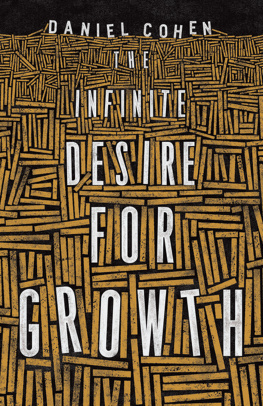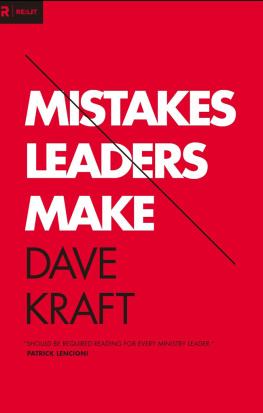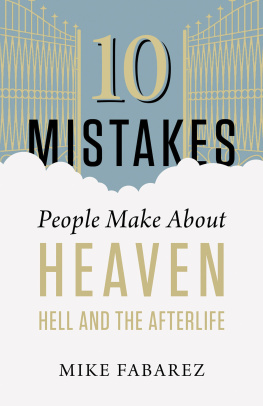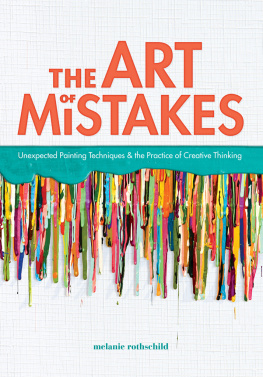WE ALL MAKE MISTAKES
I dont make many mistakes, said New Yorks colorful mayor Fiorello La Guardia. But when I make one its a beaut.
La Guardia was commenting on the discovery that one of the men he had appointed to office was a crook.
Of course La Guardia made mistakes. So do other mayors, and presidents, kings, generals, policemen, judges, scientists, explorers, millionaires, baseball players, parents, and students. We all make mistakes, lots of them. As you will see, it is those people who think that they cant make mistakes who often make the worst ones.
This is a book about historys more famous mistakes. Some of these mistakes are foolish or funny. Others are serious, terrifying, or disastrous.
The handful of stories in this book in no way covers all of the great mistakes of history. There are hundreds, even thousands of other errors that might have been included.
The aim of this bookaside from providing some entertainmentis to show you that when you make a mistake, you are not alone. You are in the company of some of the most powerful and smartest people in history.
THE $25,000 ONION
T he country of Holland is famous for its tulips. Every spring hundreds of thousands of tourists crowd into Holland for the tulip festival. Public parks and private gardens are covered with a huge variety of the brightly colored flowers.
In America wherever there are a large number of people of Dutch origin tulips are sure to be found. The city of Holland, Michigan, holds a major tulip festival every year.
There is no doubt that the Dutch love their tulips. But a little over three hundred years ago the Dutch didnt just love tulipsthey went absolutely crazy over them.
The whole tulip madness started slowly. The tulip is not native to Holland. The flower first became popular in Turkey. In fact the name tulip may come from the Turkish word for turban. Wealthy Turks prided themselves on their collections of tulips. European visitors to Turkey were attracted by the flower. They began taking tulip bulbs back with them so that they could grow the flower in their own gardens and greenhouses. Rich Europeans liked to collect strange and exotic plants and animals. To them the tulip seemed very exotic.
In its natural state the tulip is a fairly sturdy flower. It also isnt very pretty. In gardens and greenhouses, however, the tulip can be changed. Tulips of an amazing variety of colors and shapes can be produced.
The trouble is, the more beautiful or exotic the tulip becomes, the harder it is to grow. But people are strange. Often the more trouble a thing gives them the more attached to it they become. The smallest or most sickly puppy or kitten in a litter usually becomes the favorite. So it was with tulips. The mere fact that tulips were hard to grow made them seem more valuable.
Tulip growing became popular throughout Europe during the late 1500s. Nowhere in Europe were the flowers more popular than in Holland. First tulips appeared only in the gardens of the rich. Then middle-class people picked up the tulip-growing habit. Finally, no one in Holland could be considered respectable unless he had a tulip collection. The rarer and more expensive the flowers, the better their owner was thought of. Many people spent far more than they could really afford on buying tulip bulbs.
Year after year the price of tulips rose steadily. Then in 1634 something happened. People stopped buying tulip bulbs simply for display. They began to think they could make a lot of money very quickly by buying and selling tulips. Since the price of tulip bulbs always seemed to go up, people began buying bulbs, hoping to sell them at a higher price a few months later. The more people who bought the bulbs, the higher the price went. The higher the price went, the more people thought they could make money on tulips, and so on. Some people did make a lot of money. But the price rise could not go on forever.
Still, for three years Holland was in the grip of a genuine tulip-mania. The price of tulip bulbs skyrocketed. People invested all of their savings and mortgaged their homes and businesses just to buy a few tulip bulbs. At the height of the mania the price of a single bulb of a rare variety of tulip had reached $40,000 or $50,000.
The mania developed so quickly that a person who had been away from Holland for a few years would have had no idea what had happened. That was the case with a Dutch sailor. He had been on a long voyage to the Middle East. He knew nothing of tulips, and cared less. But he returned to his homeland right in the middle of the tulip-mania.
When his ship docked, the sailor was sent to the warehouse of the ships owner, a wealthy merchant. It was the sailors duty to tell the merchant that his ship and cargo had arrived safely. Since ships on long voyages were often lost in those days, this was happy news for the merchant. As a reward for bringing such good news the merchant presented the sailor with a fine red herring for his lunch.
The sailor was delighted with the herring. Still he felt that a herring alone was not enough for lunch. He wanted something to go along with the herring. Something like an onion. The sailor looked around. The warehouse was crammed with goods of every description.
On the counter the sailor saw what he took to be a small onion. The perfect thing to finish off his lunch, he thought. Surely no one would notice, or mind the the loss of such a humble and common item. So when no one was looking he slipped the onion into his pocket and walked to the dock to eat his lunch.
Tulip bulbs look very much like small onions. This one happened to be a bulb for a rare variety known as the Emperor Augustus. It was worth about $25,000. The bulb was the most expensive single item in the entire warehouse.
When the merchant discovered that the tulip bulb was missing he was horrified. He proceeded to turn the warehouse upside down looking for it. Then he remembered the sailor. Thinking the sailor must have stolen the bulb, the merchant and his employees set out to find him. Their task was an easy one. The sailor had not tried to hide. They found him sitting on the dock, chewing up the last of his lunch. When the sailor, quite innocently, described how he had eaten the valuable tulip bulb, the merchant nearly collapsed.
The poor sailor paid for his lunch, and his ignorance. The merchant brought charges against him, and he was sent to jail for several months.
There is another story from that period that seems scarcely less incredible. It is about an English visitor to Holland. The visitor was an amateur botanist. On a visit to the greenhouse of a wealthy Dutchman he spied a strange-looking onion. Being interested in unusual plants the Englishman took out his penknife and cut the onion up to see what it looked like on the inside. When his Dutch host saw what was going on he exploded in a rage.
Do you know what you are doing? he screamed.
Peeling a most unusual onion, the Englishman replied.
Dont you know its an Admiral van der Eyck.
Thank you, said the visitor, taking out his notebook to write down the name. Are these admirals common in your country?
Death and the Devil, screamed the Dutchman. He grabbed the English visitor by the collar and hauled him off to jail. The Englishman had to stay in jail until he could send for $40,000, the value of the Admiral van der Eyck bulb he destroyed.
The tulip-mania could not last forever, and it didnt. By 1637 the bottom had dropped out of the tulip market. A bulb that had sold for $40,000 at the height of the mania could be bought for $400 or less a few months later. And the price kept right on dropping.









